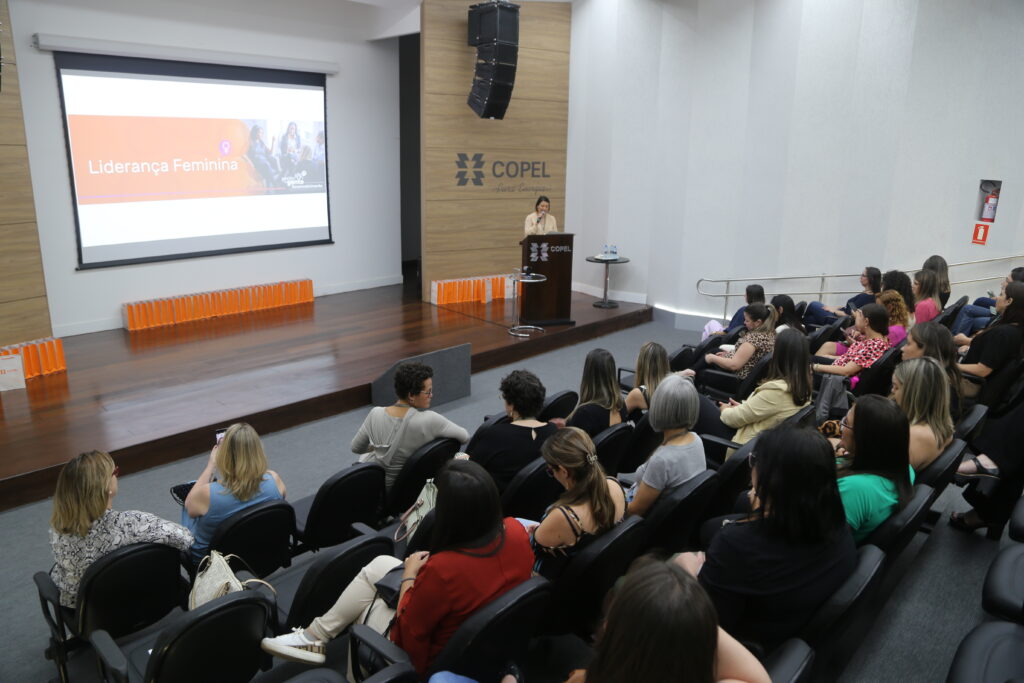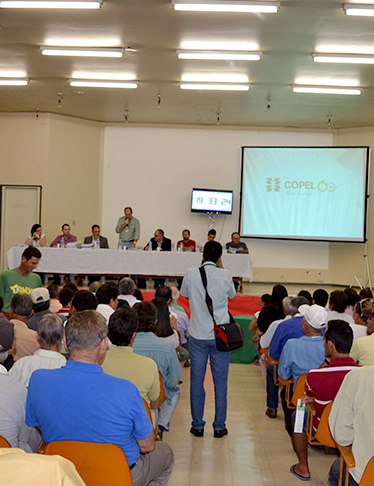Corporate Education
Copel holds as a people management strategy that nourishes and promoting education and development of employees, counting on a qualified professional staff allowing everyone to live up to their full potential in an environment that allows development of their stills and evolution of their career.
The Company promotes several educational actions, from basic training to graduate courses and research development. These actions are organized into: corporate programs, training for formation (destined to basic qualification for discharging duties), mandatory training (courses destined to specific activities), training for professional improvement, events (seminars, talks, workshops, conferences, etc.) and research and development projects.

Training and Development Input
The training needs of Copel employees are identified in different forms: results of performance reviews relative to necessary skills, implementation of new technology or methodology, and especially, needs arising from corporate strategy.
For each situation, the ways of meeting these demands are assessed based on the target public, time frame, budget and impact on the organization.The training needs of Copel’s employees are identified in different ways: results of performance evaluations in relation to the competencies required, implementation of new technologies or methodologies and, especially, needs arising from the corporate strategy.

Professional and Personal Development Programs
Copel places great value on continued education and personal and professional development of its employees, having as one of its strategic goals “To prepare people with the necessary skills for new challenges”.
To this end, the Company invests in the development of its professional staff and constantly encourages self-development of all through programs and initiatives of corporate education.
Copel’s professional development is guided by competence management, determined by the identification of training and qualification needs of the staff. In addition to corporate actions, each executive board has the autonomy to develop specific development actions according to their business strategies.
The development actions are organized as follows:
- training courses, aimed at basic training for the exercise of the function;
obligatory training, aimed at specific activities; - training for professional improvement;
- events such as seminars, lectures, workshops, congresses, etc.;
research and development projects; - development programs, with specific themes and audiences.



In addition, Copel has in its People Management Policy, the guideline to “Promote training actions for leadership and employees, seeking the improvement of their skills and competences to obtain levels of excellence in performance, as well as to encourage leadership in the pursuit of self-development”.
Thus, with the objective of promoting an environment that encourages self-development, the Company offers the following benefits to its employees:
- Educational Aid – aims to contribute to the growth and development of employees, stimulating self-development as a way to improve the Company’s performance. Copel makes partial reimbursement of tuition fees for post-secondary vocational courses, higher education courses or post-graduate courses, according to rules established in internal rules and collective bargaining agreement.
- Public Calls – partnerships with educational institutions that are interested in granting benefits to employees, some of which extend to their dependents.
- Learning Tracks – dynamic, participative and agile learning methodology, to share knowledge and contribute to the self-development of professionals. There are currently over 10 learning trails available, covering topics such as: Strategic Planning, Contract Management, Project Management, Psycho-emotional Health, among others.
- Community Sharing Energy – space available on the Office 365 platform (Yammer) for knowledge sharing among employees. Its goal is to contribute to the evolution of learning for all employees.
Development Programs - Specific Themes and Target Audiences
Cybersecurity Training Program
Following Copel’s Strategic Planning and Information Security Policy – NPC 0301, the management of cybersecurity in the Company is treated in a broad and systemic way. It starts in the Strategic Planning through the guideline “Continually raise the levels of cyber security”, defined jointly between the senior management and the company’s boards.
Additionally, its unfolding reaches the various levels of Copel through objectives and goals for the Holding Company and all its wholly-owned subsidiaries.
In December 2021, Copel hired KnowBe4, an integrated platform for information security awareness training, combined with simulated phishing attacks, thus initiating the Information Security Awareness Program, which aims to train and raise awareness among the workforce to adopt defensive behaviors in cybersecurity, aiming to:
- Increase the maturity level of the awareness programme, with a focus on changing end-user behaviour;
- Protect the company’s information assets to ensure business continuity, minimise damage and reduce potential financial losses;
- Prevent vulnerabilities from being exploited or incidents from happening in the corporate environment in cyber attacks;
- Generate a sense of responsibility, reinforcing the idea that all employees are responsible for information security;
- Preserving the confidentiality, integrity and availability of information;
- Develop the necessary skills to signal suspicious behaviour, such as phishing emails, for example;
- Measure the engagement and changes in user habits in relation to good data protection practices;
- Maintain compliance, with good practices, standards and legislation that require constant user training in cybersecurity.
Circular 043/2022, which set up the specific working group for cybersecurity, deals with training actions. The programme is structured into campaigns, all aimed at levelling knowledge and raising the level of awareness of information security in the Company.
The campaigns are created according to the content to be made available to the target public. Some defined groups are: employees and interns; managers; teleattendants of Copel Distribuição’s call center; operation technology employees of Copel Distribuição and Copel Geração; frequent travelers, among others.
In 2022, the program developed 5 training campaigns for 100% of the employees, with the following themes: secure passwords, social networks and strong passwords, phishing and incidents, mobile devices, phishing and research.
Education for Sustainability Program
The EducaODS Program is an initiative of Copel that aims to consolidate the actions in favor of the fulfillment of the 2030 Agenda and the Voluntary Commitments assumed by the Company, linking them to its Strategic Reference and its organizational values.
EducaODS unfolds in actions of all Copel subsidiaries, also reaching initiatives that deal with the dissemination of information to stakeholders about Copel’s relationship with the SDGs.
The focus is on establishing guidelines, raising awareness, disseminating, monitoring goals and engaging stakeholders in actions, strengthening management, culture and education for sustainability.
The Program is interrelated through various actions with other sustainability programs (ESG), such as Climate Change, Eco-efficiency, Waste Management, Cultivar Energia (Community Gardens), Diversity, Accessibility and EletriCidadania (Corporate Volunteering).
Among the objectives of the Program, the following stand out:
- Establish guidelines, raise awareness, disseminate and engage stakeholders in actions related to the SDGs, strengthening management, culture and education for sustainability;
- Contribute to achieving the priority SDGs of Copel and SEB (SDG 4, SDG 7, SDG 8, SDG 9, SDG 11, SDG 13), in addition to SDG 5, SDG 10, SDG 12, SDG 15, SDG 16 and SDG 17. SDG 4 can be understood as an instrument for disseminating knowledge for sustainable development;
- Demonstrate the positioning in relation to sustainable development in line with the strategy of generating value for the Company, the sector, Brazil and the world;
- Develop and propose training and lectures on the SDGs to raise awareness and sensitize all Copel’s internal public (including Senior Management, Boards and Committees), suppliers and business partners and other stakeholders.
Contribute to the employees and the Company as a whole, through their main activities, to assess their impacts, setting audacious goals and communicating their results in a transparent manner; - Seek to improve the Company’s performance in ESG indicators;
- Represent Copel in groups aligned with public policies and movements aimed at promoting the SDGs, in line with the Company’s values and policies; and
Manage corporate information (reports and questionnaires) and sustainability indicators linked to the SDGs.
The EducaODS Program covers 100% of the internal public, including own employees, contractors, interns, managers and senior management, as well as extends and remains available to suppliers and customers on the Sustainability Portal.
One of the main benefits of the EducaODS Program for Copel is the contribution to the improvement of the Company’s sustainability indicators, as employees and other stakeholders improve their practices.
Main actions of the EducaODS Program in 2022:
ESG, SDGs and Sustainability – Webinar for suppliers (05.10.2022);
ESG – Corporate, Social and Environmental Governance (date); link;
Sustainability Opportunities (06.05.2022);
ESG – Sustainability at Copel (date, link);
Lecture “Sustainability” (19.05.2022);
Presentation “SDG Initiatives at Copel” for researchers and students (17.05.2022);
Lecture “Demystifying Governance” (05.10.2022);
Female Leadership Development Program (date, link); and
Lecture “Eco-efficiency – A conversation about Water” (date; link).
Female Leadership Development Program
To promote and encourage the culture of gender equality and the role of women in Brazil and in the world is everyone’s mission. Copel, recognizing the talents it possesses, developed the Female Leadership Development Program, an initiative in line with the Sustainable Development Goals (SDG), especially SDG 5 – Gender Equality.
The first edition of the Program took place in 2022 and the second edition is taking place in 2023, with the objective of promoting the development and rise of women in the coming years so that they conquer more leadership positions in the company.
The programme is structured on the basis of the Lean in Circle methodology, developed by Sheryl Sandberg (director of operations at Facebook) from her book “Lean In”.
The Lean in Circle methodology works female leadership centered in 5 pillars: meaning, context, connections, engagement and energy. The meetings are held with small groups that, when they get together, learn to develop together, both in career and personal life, focusing on leadership and self-leadership.
In the first edition of the programme, in 2022, 90 women took part, among managers and supervisors.


Human Capital Return on Investment
The Return on Investment in Human Capital demonstrates the relationship between profitability and costs related to the Company’s employees. This indicator helps the management of Human Capital and can be improved with human capital development practices aimed at increasing the efficiency of processes and increasing revenue generation. Copel calculates the ROI in Human Capital using the formula below:
Net Operating Revenue – (Operating Costs – Costs with Employees) / Cost with Employees.
Data referring to net operating revenue, operating costs and employee costs are presented in the Management Report and Financial Statements, and other information on practices related to human capital management are presented in Copel’s Integrated Reports

Outsourced Training
External contractors in all service agreements must follow, in addition to policy, the Occupational Health and Safety Guide.
Contractually, external contractors must apply the instructions set forth in the Guide on Occupational Health and Safety for External Contractors and show satisfactory performance levels relative to management of health and safety of their employees.
Before commending activities, external contractors undergo integration training, where are addressed the risks and care referring to health and safety when carrying out tasks.
Furthermore, for risk activities, certificates of conclusion of mandatory training are required, as provided in the Regulatory Standards of the Ministry of Labor and Employment, carried out by external entities.





